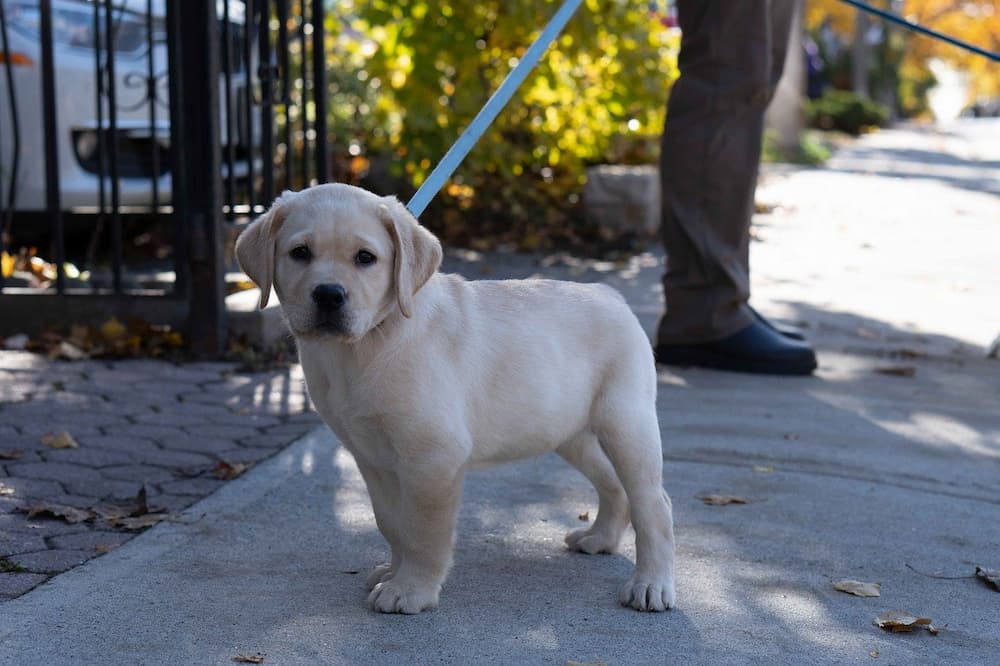In my opinion, there’s never really an age too old to get a puppy. If you want to get a puppy, regardless of its age, you’ll still be able to give it a home. However, the main downside to a puppy leaving the litter a little later can increase the potential for issues around socialization and training during their first year.
Keep reading to find out more, if it’s better to get a puppy at 8 weeks, 16 weeks old or 26 weeks.
Is 16 Weeks Too Old To Get A Puppy?
16 weeks isn’t too old to bring home a new puppy, although it’s always best to bring home a puppy is when they’re between 8-12 weeks old. At 8-12 weeks, they’re weaned from their mother, are starting to get their independence, start to socialize, soon ready for training.
16 weeks isn’t too old to get a puppy and there have been a few studies to show that this is actually quite normal.
In one notable study, they determined the effect of varying increments of socialization on the development of social behavior patterns. On 17 dogs (8 pure-bred beagles and 9 mongrels), they were then divided into 3 groups.
In the study, the first group was weaned from their mother at 3 days old, the second group at 3.5 weeks, and the third group at 8 weeks. The puppies, at 12 weeks of age, underwent a series of behavior tests. The puppies that were weaned earliest showed the largest deficit in social development, while the pups that were weaned at 8 weeks and up had little to no apparent deficits.
They found that what happens before 8 weeks is a lot of caring from their mother. In the later stages of the study, most of their development was playing with the littermates.
It wasn’t surprising to see that during the first 2 weeks; the puppies were completely dependent on the mother. A newly born puppy is still blind and deaf with poor motor skills due to the immaturity of the brain. An electroencephalogram showed no difference in the electrical activity of the brain, regardless if the puppy was awake or in a sleeping state. Stimulation through sound and light didn’t evoke a response.
During this neonatal period, the pup is highly dependent on the mother for nourishment and warmth.
Separation from the mother at this stage increases the risk of disease and can even be fatal. Puppies that are separated during this time are also more likely to develop behavioral problems when they reach adulthood, such as fearfulness on walks, noise reactivity, and excessive barking.
By the time they reach 3 weeks, the eyes and ears of the puppies gradually open, and they start to walk and explore. The mother will begin to occasionally leave her puppies, and the puppies play with their littermates.
While the puppies miss their mother for these short periods, they usually start whining and yelping when the mother leaves them, but this decreases as the pup interacts with his littermates. It’s at this stage when the socialization period begins; from 3.5 to 12 weeks.
The puppy’s socialization period refers to the process wherein the puppy is gradually exposed to new experiences, animals and objects, and many textures and sounds that they’re likely to encounter during the course of their life.
This gradually includes exposure to humans of varying ages, sexes, and races. As the puppies get more exposure, it becomes more of a challenging environment which allows the puppy to cope and develop resilience. Puppies that are more resilient can cope with new challenges in the future.
It’s at around 5-to-7-week period where the mother gradually weans her puppies by walking away, growling, baring her teeth, or biting softly, and as a result introduces them to dominant and submissive interactions, discipline, and other social behavior.
It’s still too early to take the puppy away from the mother during this stage. Puppies continue to engage in play fights among littermates, run together, bite each other, and learn to interpret vocalizations.
Puppies that have had enrichment through play by 8 weeks usually result in less fear and anxiety when they are 1.5 years old. Puppies that have more limited interaction may later manifest aggressive behavior, such as growling, snapping, biting, or lunging at an unfamiliar dog.
In some cases, some puppies may encounter a traumatic experience during this early interaction with other dogs and may also exhibit aggressive behavior by 1.5 years.
It’s recommended during this stage for interaction with unfamiliar dogs to be restricted to a safe environment.
Not every breed is the same, so there are breed-specific variations in the timing of the socialization period. For example, a Cavalier King Charles spaniel puppy can have delayed onset of early socialization compared to breeds like the Yorkshire terrier or German Shepherd.
15 Weeks Old And Socialization?
In a study, there were 34 Cocker spaniel and Beagle pups, pups that were socialized with humans before they were 3 weeks old and resulted in scoring low in behavior tests conducted at 15 weeks compared to puppies that were socialized to humans at 5, 7 or 9 weeks old. Whereas the puppies that had no socialization with humans exhibited extremely fearful and avoidant behavior towards humans.
If you got your puppy at 16 weeks old, it’ll now be ready for more interaction and socialization.
Conclusion
In short, while it’s normal for a puppy to leave their littermates at 8 weeks, bringing a puppy home at 16 weeks of age isn’t too late. At this point, they’ll have a decent degree of socialization already and are still young enough for you to train and adapt them into becoming well-behaved and well-adjusted dogs.
